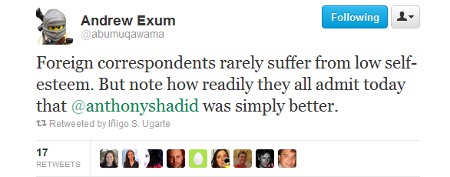Ocurre pocas veces que los periodistas se pongan de acuerdo en algo. Si se trata de la cobertura de las noticias de Oriente Medio, aún más. Sin embargo, todos hoy han sufrido una gran pérdida, la de Anthony Shadid, muerto en Siria al sufrir una crisis asmática. Dos veces premio Pulitzer es una categoría que suele concitar bastantes elogios. No tantos ni tan relevantes como los comentarios de hoy. Periodistas árabes y norteamericanos, de izquierdas y de derechas, gente con experiencia en la región o sin ella… todos han coincidido en que se trata de una pérdida difícil de soportar.
Junto a otros periodistas, como Rajiv Chandrasekaran y Thomas Ricks, realizó un trabajo excepcional en la guerra de Irak entre 2003 y 2009 en condiciones, como podemos suponer, extremadamente difíciles. Ese año pasó a trabajar para The New York Times, y de inmediato la cobertura de este periódico en la zona mejoró de forma exponencial.
No es que no pudiera hacer análisis de calidad, pero su principal arma era el trabajo básico de un reportero. Hablar con la gente y contar su historia. Suena sencillo pero no siempre lo es.
Y la humildad:
Unlike many reporters, Anthony also had humility. In 2004 I asked him a question about Iraqi politics. Anthony spoke Arabic fluently, and had knocked around Iraq before the invasion as well as after it. (His book Night Draws Near is for my money the best study of what the American occupation felt like to Iraqis.) He looked at me and said, “Actually, the more I know about Iraq, the less I understand it.” Wise words. Wise man. A big loss for us all.
–Más recuerdos de George Packer, Jon Lee Anderson, Angry Arab y Thanassis Cambanis.
–Uno de sus primeros reportajes tras la invasión de Irak: A Boy Who Was ‘Like a Flower’.
–Bullying the Press. El día en que Shadid recibió un tiro en Ramala.
–Shadid, en una entrevista en CJR:
The first or second morning after the invasion, I was so tired and I had spent so many years at the AP, learning the rules of keeping your distance from the story, and I said to myself, I’m just going to write it the way I feel it. From then on, I kind of just did that. I think you have to care about these stories to do them justice. And I did care about it. I care about the Middle East. You have to be careful and still there are certain rules you have to follow. But I think there’s enough gray there that you can kind of get away with being a little more interpretive. It’s not easy. What’s so rewarding about the reporting in Egypt, the reporting in Iraq is, if you just tell peoples’ stories, then they become the vehicles for these sentiments, these emotions. It becomes much more real in a certain way. Also much more honest.


No hay comentarios:
Publicar un comentario